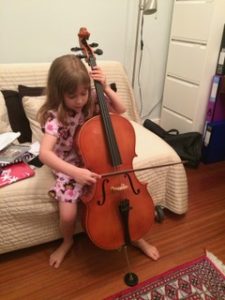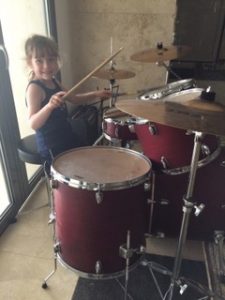 As far back as I can remember, I have always sung. As a child, I sang because I simply couldn’t help it. It nourished me, elated me and grounded me. I sang as others speak, dance, run or write. As a teenager and then an adult, I kept on singing, eventually becoming a professional opera singer.
As far back as I can remember, I have always sung. As a child, I sang because I simply couldn’t help it. It nourished me, elated me and grounded me. I sang as others speak, dance, run or write. As a teenager and then an adult, I kept on singing, eventually becoming a professional opera singer.
Today I am also a mother and a singing teacher. The combination of these roles has led to my appointment as resident dinner party expert on all things music. Parents who approach me have all have the same burning question: when should their child start his/her formal music education?
My answer often startles them: much later than you think. Most professional musician friends of mine who also teach children share the same view. Many argue that before the age of 4-5 is too young.
While many of us may harbour the hope that they’re raising the next Mozart, the reality is that music geniuses are extraordinarily rare. In fact, most children are only modestly musical and that is fine. It’s fine because music is worth pursuing for its own sake, independently of the benefits – social recognition, financial awards, professional accolades – that may result from its practice.
Children shouldn’t start music because their friends are, because scholarships will be up for grabs later or because it looks good on their resume. Instilling a love of music has nothing to do with that, and often can be destroyed by it.
Experiencing music
If you are keen for your children to experience music, take them to family concerts and events at places like Wigmore Hall, Cadogan Hall and at the various London music colleges to name but a few. Their children’s and family events are fun, interactive and inspiring. Even the Royal Opera House Covent Garden organises workshops and special concerts. What better way to get young ones inspired!
At home, no need to be highbrow about what you listen to; anything from Mozart to jazz to Beyonce should play on your speakers and accompany daily activities. In my house, there is a lot of air guitar playing and making up songs for everything we do.
The benefits on the brain
Why? Numerous studies have shown the benefits of playing a musical instrument and demonstrated how it helps learning. Playing an instrument teaches you to think vertically on top of horizontally. It is like 3D. As a musician, you are always looking ahead to what is coming next whilst playing or singing what is right in front of you. On top of what is already quite a challenging task, you need to think about rhythm, melody, note values, beats, rests, what key you are playing or singing in and much more.
If you are a singer, you do all of the above while also singing the words. When singing in a foreign language, you need to know what the meaning of each word as well as its correct pronunciation. In addition, you need an understanding of the historical and social context of the piece.
Obviously, when a child is just starting out, they won’t be able to do all of the above. Meanwhile parents often fail to grasp the intellectual and physical complexity of the task at hand and often become convinced their child should make faster progress. Unfortunately learning to play music is not quite like learning your times table.
When exams loom
If your child attends a music academy or takes lessons at school, they will within a few years inevitably be asked to sit for music exams. It’s the reality of our society that it likes to measure achievement and provide targets.
Some children will be unfazed at the perspective and generally unaffected, others will work harder and push themselves to perform well on the day and some others still will freeze, balk and completely lose their enjoyment of the instrument in the process. A parent’s strategy should differ depending on the way the child experiences exams.
If you decide to let your child take exams, respect some ground rules.
- If they don’t do as well as you would like them/expected them to, don’t tell them. Praise the work and effort that has gone into the performance. Showing disappointment is counter-productive and can really harm your child’s imagination and creativity. The result of anything that involves performing, is nothing more than a snap-shot of what your child achieved right there and then.
- Do not take ownership of your child’s music path. If you wished you had learned an instrument as a child, learn it now. Don’t pass on ambitions that are not shared. Think about what kind of child you have; are they agreeing to doing exams just to please you or are they doing them because they actually really want to do them? That could affect the results, so be honest and mindful of that.
- Please remember that oftentimes your child isn’t just taking music exams, but also dance, drama and other subjects. It is near impossible to excel at them all while also enjoying them, consider scrapping some before it gets too much.
 Seek music for its own sake
Seek music for its own sake
In today’s ultra competitive schooling environment, especially in London, excellent academic results are essential to secure a place at a top school, but often not enough.
The most academic schools will expect your child to stand out in other ways, and playing an instrument or singing at a high level are an obvious way to shine.
Many parents have cottoned on to that fact and pursue musical achievement for this sole purpose. The reality, however, is that the vast majority of children will never win a music scholarship. To even be considered for one at 11+ a child needs to play at least a grade 6 or 7, sometimes on multiple instruments.
That’s thousands of hours of daily practice. It means sacrificing other activities, turning down many invitations, having less time for homework, taking instruments on holiday etc. None of these restrictions will weigh heavily if your child deeply enjoys music. If they don’t and are playing to please you, the burden will be unbearable.
And, many children already have so much stress in their lives that they don’t need that extra burden. So by all means, have your child play an instrument or sing. But don’t make it a mission.



